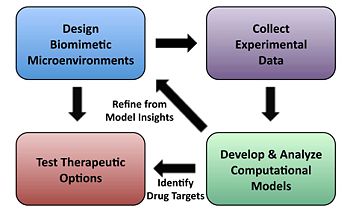Kreeger: Difference between revisions
From OpenWetWare
Jump to navigationJump to search
No edit summary |
No edit summary |
||
| (29 intermediate revisions by the same user not shown) | |||
| Line 5: | Line 5: | ||
<div style="padding: .4em .9em .9em"> | <div style="padding: .4em .9em .9em"> | ||
{|cellspacing="1" cellpadding="3" style="background:#ffffff; width: | {|cellspacing="1" cellpadding="3" style="background:#ffffff; width: 700px;" | ||
|style="background:#ffffff"| | |style="background:#ffffff"| | ||
<font size="2"> | <font size="2.5"> | ||
'''How do cells respond to information from their surroundings and use this information to make decisions?''' <br> | |||
[[Image:Kreegerlaboverview.jpg|350px|right]] | |||
< | <font size="2.5"> | ||
The Kreeger lab utilizes systems biology and tissue engineering to analyze this question in a variety of biological contexts. We utilize an iterative approach, where we develop model culture systems that allow us to study these diseases in a controlled environment, use a variety of high-throughput experimental methods to gather information about the cellular signaling network, and employ computational models to interpret the data. Ultimately, our models will be utilized to identify new drug targets, match patients to the most effective drugs, and identify methods to direct cellular behavior in tissue engineering. | |||
<br> | |||
<br> | |||
<br> | |||
The Kreeger lab is part of the Department of Biomedical Engineering at the University of Wisconsin-Madison. | |||
|} | |} | ||
Revision as of 18:44, 12 August 2012

